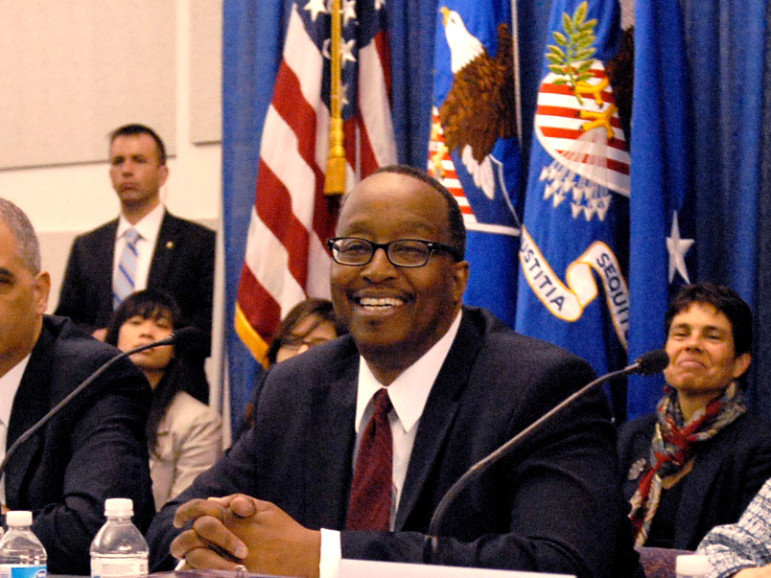
WASHINGTON — Robert L. Listenbee Jr., the embattled administrator of the federal Office of Juvenile Justice and Delinquency Prevention, has drawn considerable support from juvenile justice advocates who credit him with laying the foundation for transforming the agency.
Listenbee, who enters his third year at the helm of OJJDP next month, has come under increasing scrutiny in recent weeks.
In mid-January, Sen. Charles E. Grassley, R-Iowa, asked the U.S. Justice Department to respond to whistleblowers’ claims that OJJDP had knowingly violated federal law by giving grants to states that incarcerated runaway foster children and other “vulnerable minors.”
Then the president of a union representing rank-and-file OJJDP employees called for Listenbee’s resignation, saying morale has eroded under his leadership and the agency had “spiraled out of control” amid a climate of fear of retaliation for dissent.
Listenbee, in written responses to JJIE questions last week, said the Office of Justice Programs, of which OJJDP is a part, has been working to “address concerns” expressed by Marilyn Moses, the president of the union, AFSCME Local 2830. And Listenbee said the Department of Justice and OJP are working with Grassley’s office in response to letters the senator sent to DOJ. Grassley had demanded an explanation for allegations of fraud in awarding of grants and incarcerating children with adults in violation of federal law.
In response to criticism of Listenbee by the union and Grassley, juvenile justice advocates have lined up in support of the nation’s top juvenile justice official.
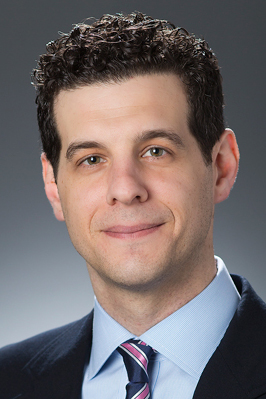
The Annie E. Casey Foundation
Nate Balis
“Under Bob Listenbee’s leadership, OJJDP has promoted a national juvenile justice reform agenda rooted in research, guided by best practice and aimed at reducing racial disparities,” said Nate Balis, director of the Juvenile Justice Strategies Group at the Baltimore-based Annie E. Casey Foundation, in an email.
Like other Listenbee backers, Balis said the OJJDP chief has strongly backed and strived to put into practice recommendations in two groundbreaking reports by the National Research Council of the National Academy of Sciences.
The second of the two reports, “Implementing Juvenile Justice Reform: The Federal Role,” released in October, outlines ways OJJDP can support juvenile justice reform through a “developmental approach,” based on findings of NRC’s first report, released in 2012.
The NRC reports highlight research showing adolescents are more prone than adults to risk-taking and “novelty-seeking behavior” like alcohol and drug abuse, more susceptible to peer pressure, less likely to weigh long-term consequences of their actions, but also more amenable to rehabilitation. The report puts a premium on rehabilitation, particularly of nonviolent youths, over incarceration.
“We are encouraged by an agenda that has … embraced the developmental approach advocated by the National Academy of Sciences and provided grants to promote racial equity and the implementation of state-level policy reforms,” Balis said.
Listenbee has developed a reputation for working in partnership with private organizations known for juvenile justice reform as part of his efforts to rely much less on incarceration and more on rehabilitation, one of the key goals of the juvenile justice system.
In an interview, Balis said Listenbee, appointed by President Barack Obama in February 2013, has used the OJJDP “bully pulpit” successfully to “focus on not just passing legislation but actually implementing it on the ground.”
Balis noted the second NRC report focused specifically on the federal role in juvenile justice reform: “He was a big advocate of that report … when it comes to his role at OJJDP for the two years, I think we can all say it’s moving in the right direction.”
Sandra Simkins, a professor at Rutgers School of Law in Camden, N.J., got to know Listenbee when she served as a public defender when he was leading the Defender Association of Philadelphia. He spent nearly three decades there, including 16 years as chief of the juvenile unit.
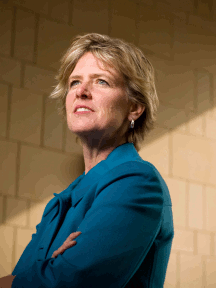
Rutgers School of Law
Sandra Simkins
“He is absolutely the real deal; he is a visionary,” said Simkins, who also runs the Children’s Justice Clinic at the law school. “This is a guy who really wants good outcomes for kids and is willing to work with just about anybody to get them, which is I think kind of rare.
“I know that he has enormous support around the country from all juvenile justice advocates for his vision and his reform-minded approach to bring better outcomes for kids.”
Simkins praised Listenbee’s management style, including his ability to motivate others, and said his knack for doing so led to more and more managerial roles for him at the association.
“Bob has a long, long history of being asked to be a leader on a wide variety of issues relating to kids for decades, so from where I sit, you cannot do better than Bob,” she said.
For her part, Marie Williams, executive director of the Washington-based, nonprofit Coalition for Juvenile Justice, said in an email: “We can attest to the open, inclusive and collaborative spirit we have seen since [Listenbee] assumed his role at the agency.”
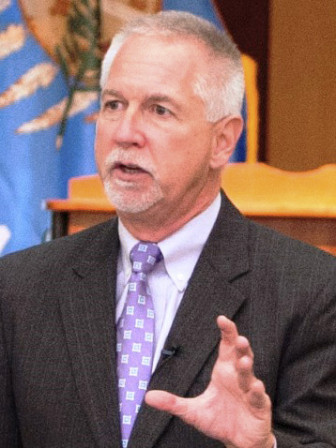
John Tuell
John Tuell, executive director of the Boston-based Robert F. Kennedy National Resource Center for Juvenile Justice at the RFK Children’s Action Corps, praised Listenbee for lobbying hard for the long-overdue reauthorization of the Juvenile Justice and Delinquency Prevention Act (JJDPA). The 1974 law established OJJDP and now contains four core requirements that set standards for care and custody of youths in the juvenile justice system and provide funding to help states meet the standards.
The JJDPA was last updated in 2002, lapsed in 2007 and has not undergone major overhaul for nearly two decades.
A bipartisan bill introduced in December by Sen. Sheldon Whitehouse, D-R.I., and Sen. Grassley — and expected to be reintroduced soon — would reauthorize JJDPA with several key changes: phasing out exceptions that allow detention of repeat “status offenders” (youths who commit offenses like truancy or alcohol possession); putting teeth into a requirement on disproportionate minority contact with the juvenile justice system rather than just counting instances of it; cutting the number of youths placed in adult jails; offering states incentives if they rely less on incarceration; and improving education for incarcerated youths.
Tuell, who was OJJDP’s deputy director of state relations and assistance division for about five years beginning in the mid-1990s, described Listenbee as a “very active listener to the field.”
Before Listenbee’s arrival, Tuell said, OJJDP had become focused largely on monitoring and compliance with core requirements and not on applying the latest research on adolescent brain development as a basis for reforming juvenile justice.
“He was open and active about receiving that [NRC] research” despite resistance from some veteran OJJDP employees “who had kind of retrenched and were not exactly open to some new ways of doing business,” Tuell said. “And that is a huge challenge that he undertook to be so open about those kinds of changes and advances, and I think he deserves credit there.”
Tuell also said Listenbee has shown his willingness to explore new ways to reform juvenile justice and pointed to $500,000 in funding to RFK from OJJDP and the Chicago-based John D. and Catherine T. MacArthur Foundation for four demonstration projects on innovative ways to help “dual-status” youths — those involved in both the juvenile justice and child welfare systems.
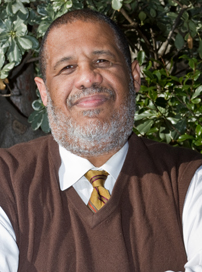
W. Haywood Burns Institute
James Bell
Listenbee also drew praise from James Bell, executive director of the Oakland, Calif.-based W. Haywood Burns Institute, which strives to eliminate racial and ethnic disparities in the juvenile justice system.
Bell said Listenbee is the first OJJDP administrator to take concrete steps to eliminate, rather than merely track, disparate minority contact.
“Ever since Bob has come into office, he has said that he wanted to move from identification to intervention and by engaging conversations, ideas, thoughts from people that did that work,” Bell said. “It was the first time we felt like OJJDP wanted to move from endlessly identifying the problem to actually starting to intervene.
“He has come in and energized those of us out there in the field. In the 25 years that I’ve been doing advocacy, it is the most traction that we have ever gotten as a community that cares about racial and ethnic disparities,” Bell said.
He said the Burns Institute had never applied for an OJJDP grant before Listenbee’s appointment. The institute, along with Development Services Group, a Bethesda, Md., firm that works with ministries and nonprofits, were awarded a $1 million OJJDP grant in November to work toward reducing racial and ethnic disparities in the juvenile justice system.
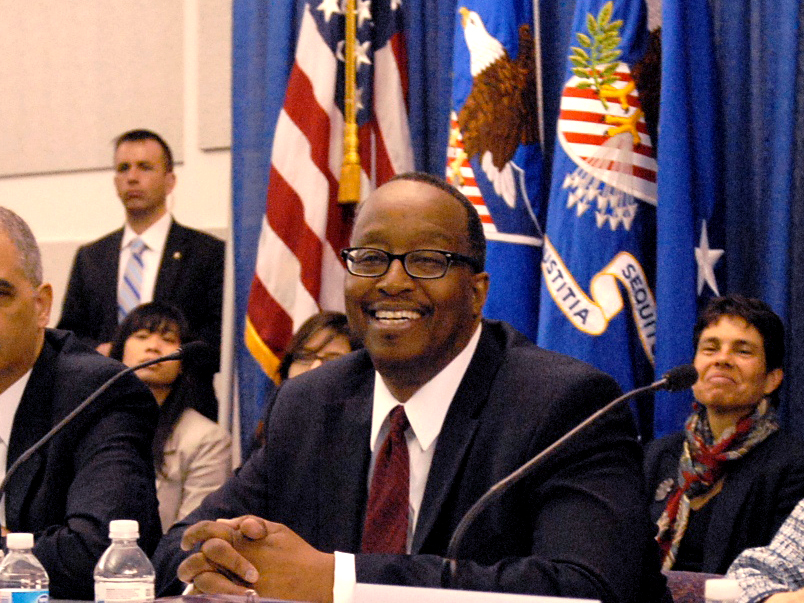
“He said the Burns Institute had never applied for an OJJDP grant before Listenbee’s appointment. The institute, along with Development Services Group, a Bethesda, Md., firm that works with ministries and nonprofits, were awarded a $1 million OJJDP grant in November to work toward reducing racial and ethnic disparities in the juvenile justice system.”
That about sums up why people are clamoring to support people.